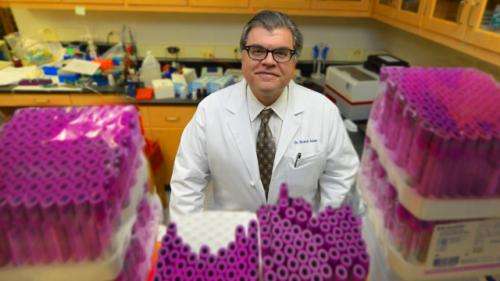Link between obesity and polycystic ovary syndrome may be exaggerated

The relationship between obesity and polycystic ovary syndrome may be exaggerated, likely because the women who actively seek care for the condition tend to be heavier than those identified through screening of the general population, researchers report.
PCOS affects about 10 percent of women and is characterized by excess male hormone, irregular ovulation and menstruation as well as increased risk of metabolic diseases often associated with being overweight.
The study in the Journal of Clinical Endocrinology & Metabolism looked at what have long been considered indicators of the disease, including obesity, high testosterone levels and excess body hair, in women actively seeking care for PCOS as well as those identified with PCOS through a general pre-employment health screening.
They found that the women with PCOS identified through the screening had about the same obesity rates as those who didn't have PCOS, said Dr. Ricardo Azziz, reproductive endocrinologist and PCOS expert at the Medical College of Georgia at Georgia Regents University. However, obesity rates in patients actively seeking treatment were about 2.5 times higher than in women identified with PCOS through the screening of the general population.
"The women actively seeking care had higher male hormones, more hair growth, more severe ovulation problems, which was not surprising because patients who have a more severe condition are more apt to seek medical care," said Azziz, the study's corresponding author. "What is surprising to us is that the rate of obesity in women with PCOS who we found in the general population is nowhere near as high as we expected from studying women with PCOS who did seek care."
"This finding indicates that while obesity is a major problem for everyone who has it, we should treat obesity as obesity and probably not try to link obesity as a sign of PCOS," Azziz said. He notes that obesity has been considered a hallmark of the condition since it was first described in 1932 and that the ongoing association likely is perpetuated by a bias resulting from patients who self-refer for care.
A more accurate picture of PCOS likely would emerge if studies of the condition also included patients identified through screening the general population, Azziz said. "A lot of patients believe PCOS leads to obesity and we really don't have strong data to support that. In fact, our evidence suggests that is not the case."
"We do know that the more fat you have, the more metabolic dysfunction you have, regardless of whether you have PCOS," Azziz said. Growing evidence also suggests that – regardless of how much they have – the fat in women with PCOS behaves differently.
Fat, a huge organ even in thin individuals and a literal hormone factory, is a major site where the body uses insulin to convert glucose consumed in food to energy. Azziz and his colleagues reported in another recent study in the journal Diabetes differences in the fat of women with PCOS, showing that several tiny RNA molecules, called microRNA, were overexpressed in the fat of those who also were insulin-resistant, resulting in decreased expression of GLUT4, a key protein that regulates fat's use of glucose for energy.
The new studies were done on 64 women being treated for PCOS and 688 women seeking pre-employment physicals at the University of Alabama at Birmingham. Dr. Uche Ezeh, Department of Obstetrics and Gynecology and Center for Androgen-Related Disorders at Cedars-Sinai Medical Center in Los Angeles, is the study's first author. Dr. Bulent O. Yidiz, Department of Internal Medicine and the Endocrinology and Metabolism Unit, Hacettepe University School of Medicine in Turkey, is co-author.














